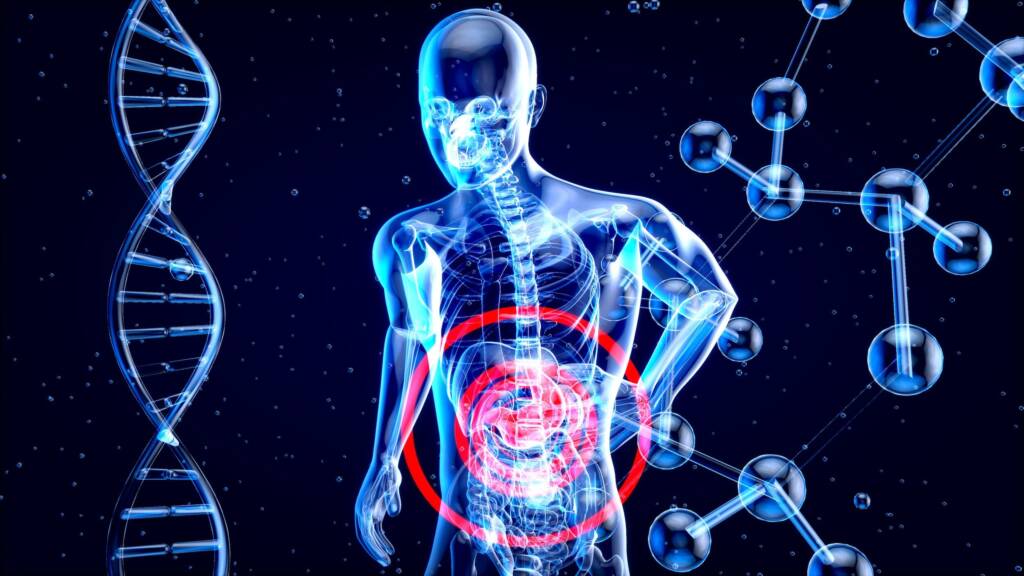
The Role of the Gut Brain in Emotions and the Sympathetic and Parasympathetic Nervous Systems
The gut brain, also known as the enteric nervous system, plays a crucial role in managing our emotions and controlling the sympathetic and parasympathetic nervous systems. Though often overshadowed by its more famous counterpart, the central nervous system, the gut brain holds significant influence over our overall well-being.
When it comes to emotions, the gut brain is intimately connected to the limbic system, which is responsible for regulating our emotional responses. This connection allows for a bidirectional communication between our gut and brain. Countless studies have shown that emotional states such as stress, anxiety, and excitement can directly impact our gut, leading to digestive discomfort or even “butterflies” in the stomach.
Furthermore, the gut brain is responsible for the production and regulation of neurotransmitters, such as serotonin and dopamine, which play key roles in mood regulation. In fact, approximately 95% of serotonin, often referred to as the “happy hormone,” is produced in the gut. This highlights the essential role the gut brain plays in our emotional well-being and mental health.
Additionally, the gut brain is instrumental in regulating the two branches of the autonomous nervous system: the sympathetic and parasympathetic nervous systems. These systems work in tandem to control our body’s responses to different situations. The sympathetic nervous system gears us up for action in times of stress or danger, commonly known as the “fight or flight” response. On the other hand, the parasympathetic nervous system promotes rest, relaxation, and digestion, often referred to as the “rest and digest” response.
Interestingly, the gut brain is able to influence the sympathetic and parasympathetic nervous systems. When we experience stress or anxiety, the gut brain can send signals through nerves and neurotransmitters to activate the sympathetic nervous system, triggering the release of stress hormones like cortisol. This response can lead to an increased heart rate, heightened alertness, and a decrease in digestive functions.
Conversely, the gut brain also plays a role in activating the parasympathetic nervous system when we’re in a state of relaxation or digestion. By releasing certain neurotransmitters and stimulating the vagus nerve, the gut brain can promote a soothing response, allowing our bodies to rest and restore.
Understanding the significance of the gut brain in managing our emotions and controlling the sympathetic and parasympathetic nervous systems opens up new possibilities for holistic approaches to well-being. Through techniques such as gut-friendly diets, stress management, and practices that nurture emotional health, we can support and optimize the functioning of our gut brain. This, in turn, can positively impact our emotions, stress levels, and overall physical health.
As Twin Flame Coaches, we recognize the interconnectedness of the mind, body, and spirit. By addressing the needs of the gut brain and understanding its role in emotions and the autonomic nervous system, we can guide our clients towards a harmonious and balanced state of being, conducive to personal growth and fulfilling relationships.

Heart Brain: Nurturing the Connection
Subtitle: Exploring the Symbiotic Relationship Between Emotions and Reason
When it comes to decision-making and problem-solving, most people rely on their logical brain, granting it absolute authority over matters big and small. However, an emerging perspective suggests that the heart plays a vital role in guiding our actions and shaping our lives. This concept, coined the “heart brain,” challenges traditional notions about the mind-body connection and invites us to explore the profound influence of emotions on our mental processes.
The heart brain embodies the integration of our emotional intelligence with our cognitive abilities. As we delve deeper into the complex interplay between the heart and the brain, it becomes evident that emotions are not mere ephemeral sensations but powerful catalysts that influence our perception, judgments, and behaviors. In essence, the heart and the brain engage in an intricate dance, each informing and shaping the other.
At the core of the heart brain concept lies the idea that emotions serve as messengers, relaying important information to the logical brain. Rather than dismissing emotions as irrational impulses, we are encouraged to embrace them as meaningful signals that inform and enhance our decision-making processes. Studies have shown that emotions can act as intuitive guides, rapidly processing vast amounts of information and aiding in quick, nuanced assessments of situations.
Moreover, the heart brain connection extends beyond decision-making. Emotions play a crucial role in memory formation and retrieval, affecting our ability to retain information. It’s through emotional resonance that we remember the details of significant moments, relationships, and experiences. Harnessing the heart’s emotional intelligence can therefore deepen our connection with our memories and enrich our understanding of both ourselves and others.
Furthermore, the heart brain connection is not merely individual but also extends to interpersonal dynamics. Empathy and compassion, emotions deeply rooted in the heart, enable us to understand and connect with others’ experiences, beliefs, and perspectives. By acknowledging the heart’s capacity for empathy, we can foster deeper connections in our personal and professional relationships, improving communication and collaboration.
In today’s fast-paced and digitally connected world, it is essential to nurture the heart brain connection to maintain balance and well-being. Incorporating mindfulness and self-reflection practices into our daily lives can help us tap into the wisdom of the heart and create space for emotional self-awareness. By acknowledging and honoring our emotions, we allow ourselves to make more conscious decisions, grounded in both compassion and reason.
Heart brain coaching offers a transformative approach to personal growth and development. By integrating emotional and cognitive processes, clients are supported in navigating relationships, career choices, and life transitions with greater clarity and authenticity. Through customized techniques and exercises, individuals can develop a deep understanding of their emotions, harnessing their power to create a meaningful and fulfilling life.
In conclusion, the heart brain concept invites us to embrace the essential connection between emotions and reason. By acknowledging the wisdom of the heart and nurturing the heart brain connection, we can cultivate emotional intelligence, enhance decision-making skills, and foster healthier relationships. As we recognize the innate intelligence of the heart, we unlock a limitless potential for growth, fulfillment, and profound self-discovery.

Aligning Your Brain with Your Heart and Stomach: Allowing Emotions to Flow Harmoniously
In the journey of navigating our emotions, it becomes vital to align our brain with our heart and stomach. When the intricate connection between these three powerful centers of our being is balanced, our emotions flow harmoniously, leading to positivity and overall well-being. Let us explore this holistic approach to emotional alignment.
Understanding the Brain, Heart, and Stomach Connection
Our brain, often deemed as the control center of our thoughts, governs our cognitive and logical reasoning. It processes information, memorizes, and analyzes data. Our heart, on the other hand, is perceived as the emotional center, the place where love, compassion, and empathy reside. Meanwhile, the stomach, which encompasses our gut instincts, represents our intuitive nature and instincts.
Yet, it is essential to acknowledge that these centers are linked intricately, and the flow of emotions is not solely governed by one. Research suggests that the heart and stomach possess a network of neurons, similar to those found in the brain. This connection, known as the “heart-brain” and “gut-brain” axis, enables information exchange between these centers, significantly influencing our emotions.
Aligning the Brain
To align the brain with our emotions, it is crucial to nurture self-awareness and mindfulness. By practicing mindfulness, we can observe our thoughts without judgment, allowing us to identify any negative or limiting beliefs that may hinder our emotional well-being. With this awareness, we can consciously choose thoughts that uplift and support our desired emotional state.
Additionally, engaging in cognitive exercises, such as positive affirmations and reframing negative thoughts, can help rewire our brain and create a healthier mindset. By consciously aligning our thoughts with our desired emotions, we begin to create a positive feedback loop between the brain and the other emotional centers.
Honoring the Heart
The heart, the domain of compassion and love, plays a significant role in our emotional alignment. To nurture this connection, it is crucial to practice self-compassion and cultivate empathy towards ourselves and others. Engaging in activities that bring us joy, such as hobbies, spending time with loved ones, or acts of kindness, allows us to synchronize our brain and heart, promoting emotional coherence.
Deep breathing exercises, heart-focused meditations, and gratitude practices can also aid in harmonizing the heart’s energy. By consciously directing our attention to our heart, we can tap into the wellspring of love and compassion, facilitating emotional balance.
Listening to the Gut
Our gut instinct, often associated with intuition, guides us towards choices aligned with our authentic selves. Honoring this aspect involves fostering connection with our body’s cues. Paying attention to sensations in our stomach, noticing when it tightens or expands in response to various situations, empowers us to make choices that align with our values and true desires.
Practicing mindfulness while eating, with gratitude for the nourishment we receive, can also enhance the gut-brain connection. Consuming a balanced, nutritious diet further supports our gut health, which has been linked to emotional well-being.
Embracing Emotional Flow
True emotional alignment occurs when the brain, heart, and stomach operate in harmony, allowing emotions to flow without resistance. It is essential to remember that emotions are not to be suppressed or ignored but rather acknowledged and processed.
By integrating mindfulness practices into our daily lives, embracing self-compassion, and listening to our gut instincts, we create space for emotions to be experienced fully and authentically. This alignment fosters emotional intelligence, resilience, and a deeper connection with our authentic selves and others.
Remember, aligning your brain with your heart and stomach is a practice and a journey. Embrace it with patience and curiosity, and witness the transformative power it has on your emotional well-being.
At Twin Flame Coaching of Central New York, we are here to support and guide you in aligning your brain, heart, and stomach.
